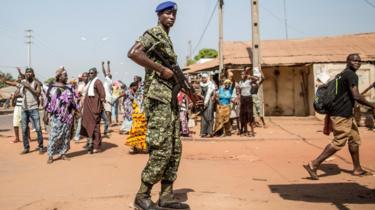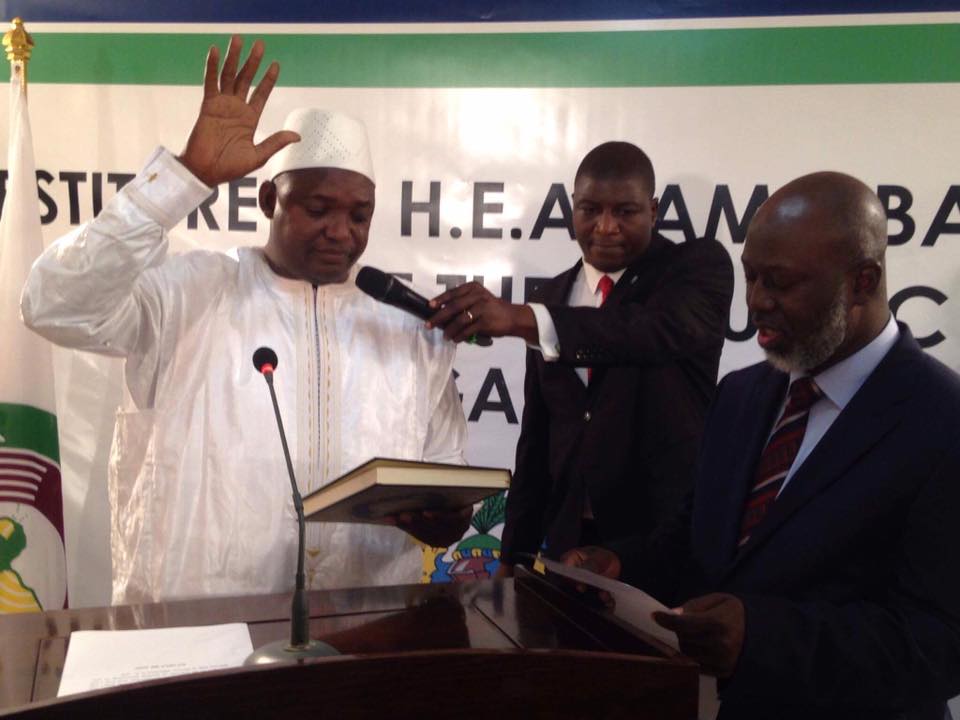Adama Barrow, the man who won The Gambia's disputed election, has been sworn in as the third president of the tiny West African nation.
Mr Barrow took the oath at the country's embassy in Senegal.
He has been recognised internationally. But Gambian strongman Yahya Jammeh has refused to step down and his term in office has been extended by parliament.
West African leaders have tried to persuade Mr Jammeh to admit losing the election. They have threatened to remove him by force.
Mr Jammeh lost last month's elections, but wants the results annulled citing errors in the electoral process.
Mr Barrow took oath at the Gambian embassy in Dakar.
Western ambassadors to Senegal attended the ceremony, while hundreds of Gambian expatriates gathered outside the compound.
West African military forces, stationed at the border, say they are ready to enforce a transfer of power in The Gambia, a popular beach destination among European holidaymakers.
UN Security Council backing for intervention is being sought by Senegal and the regional bloc Ecowas, but some diplomats said if Mr Barrow, 51, requested help after his inauguration such approval would not be needed.
Meanwhile, Mr Jammeh's term in office has been extended by a two-third majority in parliament, and some experts say he still has a legitimate claimed to be called the country's president.
 Image copyrightREUTERS
Image copyrightREUTERSAt the scene - Thomas Fessy, BBC News, Banjul
It is eerily quiet in The Gambia's capital. Most streets are deserted; shops, petrol stations and banks are all closed. People are mostly staying home uncertain about what may happen as European tourists continue to evacuate their hotels.
In some areas, men are standing on the roadside, arms crossed or looking at their phones. Some told us they were waiting for President Jammeh to go and would take to the streets once Mr Barrow was sworn in this afternoon.
They said they wanted West African troops to come in as soon as possible. Some also told us they were worried about Mr Jammeh's actions should there be an offensive against him. But so far we have seen little presence of security forces in the city.
Could there be conflict? - Joseph Winter, BBC News
Hopefully not. The Gambia's army chief, previously seen as a close ally of Mr Jammeh, seems wary of action. "This is a political dispute. I am not going to involve my soldiers in a stupid fight. I love my men," the AFP news agency quotes Ousman Badjie as saying.
However, he has little influence over an elite unit of fighters, called the Gambia National Guard, who may opt to fight even if vastly outnumbered by the Senegalese and Nigerian forces as they are from the same ethnic group as Mr Jammeh. The Gambia's armed forces is said to number 2,500. Image copyrightAFPImage captionIf regional forces entered The Gambia, it is believed ordinary recruits would not fight
Image copyrightAFPImage captionIf regional forces entered The Gambia, it is believed ordinary recruits would not fight
One key question is how ordinary Gambians see the Senegalese troops if they do cross the border. The Gambia and Senegal are made up of the same ethnic groups which were divided by colonial borders, so they speak the same languages and share the same culture.
However, a fierce rivalry has developed between the two nations, with many Gambians feeling they are looked down on by their more numerous, French-speaking neighbours.
So while supporters of Mr Barrow will presumably see any intervention favourably, there is also a danger that it could be seen as a foreign invasion force.
Why is Mr Barrow in Senegal?
Mr Barrow, a property developer who has never held public office, has been in Senegal since the weekend following an invitation to attend a summit of African leaders who back his victory.
He did not even go back home when his eight-year-old son died after being mauled by a dog. He missed the funeral on Monday as he was advised to remain in Senegal for his safety.
The president-elect tweeted and posted on Facebook that his inauguration would take place at 16:00 GMT at the embassy in the capital, Dakar.
He has joined at least 26,000 Gambians, fearful of violence, who have sought refuge in Senegal.
His spokesman says Mr Barrow's team is keen for a peaceful resolution, but accepts military intervention may be inevitable.
"Ecowas is on the side of President Barrow - and if he's sworn in obviously he has to be at the State House. If the other side refused then you are simply talking about a state of war," Halifa Sallah told the BBC's Newshour programme.
He said that President Jammeh had been given a letter promising that he would be given the same rights and privileges as Dawda Jawara, The Gambia's only other ex-president.
Why is Mr Jammeh refusing to stand down?
Mr Jammeh, who first came to power in a bloodless coup 22 years ago, initially accepted defeat, but later reversed his position.
The electoral commission has accepted that some of the results it initially published contained errors, but said they would not have affected Mr Barrow's win.
His legal challenge to have the vote annulled cannot be heard by the Supreme Court until May because of a lack of judges, so parliament has stepped in and extended his term in office by 90 days and imposed a three-month state of emergency.
Human rights groups accuse Mr Jammeh, who has in the past claimed he can cure Aids and infertility, of repression.
Retaining power would also ensure he was not prosecuted in The Gambia for alleged abuses committed during his rule.
Source: BBC





